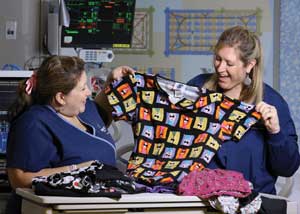Nurse Educators Are Advocates for Knowledge
by Mat Edelson
Part cheerleader, part taskmaster, nurse educators are often the driving force propelling lifelong learning in the hospital setting. Most caught the learning bug early on in their careers, then shifted into the nurse educator role as that became formalized throughout hospitals. That role is as varied as education itself: orienting new nurses and nursing students; coordinating in-services regarding new products and standards; testing staff to see whether their skills meet required competency levels…all fall under the nurse educator’s official purview.

But peel back their formal authority and, to a person, nurse educators are enthusiastic advocates for all things learning. They see education like a Swiss Army knife, capable of giving the user just the right tool to solve the problem, be it a conundrum at the bedside, a desire for promotion, a pathway for policy change, or a foundation for scientifically investigating clinical concerns. It’s the nurse educator’s job to match the learner with educational need, giving the seed the right environment in which to flourish.
“One thing I’ve found is we have individuals who are self-directed and internally motivated. Many will take what is offered [educationally] and run with it; they have a zest for learning,” says Barbara Fitzsimmons, MS, RN, CNRN, nurse educator for the Neurology CCU and Neuro inpatient units. Fitzsimmons helps stretch her nurses by offering semiannual neuroscience certification exam reviews. Any neuro nurse with two years of service is encouraged to attend, with Hopkins picking up the costs. Fitzsimmons says that credentials such as certification are important benchmarks for establishing a lifelong learning culture for nurses within a hospital.
“Nurses are very proud of their credentials. The more initials after your name, you show what you’ve accomplished. It demonstrates to colleagues and patients and their families how much they value education, and are achieving excellence in their field.”
These visible accomplishments, worn, if not on a sleeve, then a nametag, act as a silent but constant reminder to others that ‘if I did it, you can, too.’ In this, nurse educators see themselves and other nurses with advanced degrees as role models for nurses working their way up the clinical ladder.
Oncology Nurse Educator Barb Van de Castle, MSN, OCN, APRN, BC, says her bedside nurses regularly interact with her and clinical nurse specialists, and quickly see the benefits when they decide to return to school. “Right now we have a couple of our regular staff in grad school. And though they’re not clinical nurse specialists yet, they become what’s called a ‘Resource Nurse’ on that unit,” she says. “So they see how they can begin to move up that clinical ladder and get appreciation for what they’ve learned and continue to grow.”
Which is all a lifelong learner needs to flourish.